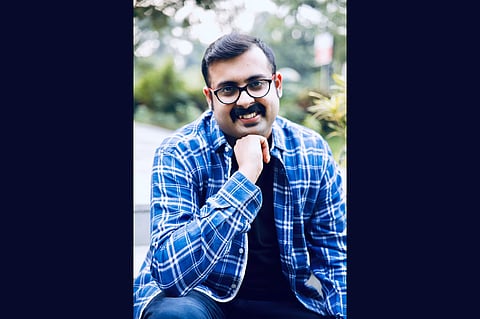Kolkata based music composer Ananjan Chakraborty merges pop with Thumri through his rendition of Lonely
Kolkata based sound engineer Ananjan Chakraborty hails from a family of musical legends. Born to Pt. Ajoy Chakraborty and younger brother of classical singer Kaushiki Chakraborty, Ananjan however took a lesser explored approach towards music and shaped it into his career. The Digital Academy Mumbai graduate also dons the hat of a music composer and has come up with a new musical genre called Electronic Classical Music which was introduced to the world in presence of Ustad Zakir Hussain. We caught up with the musician on his launch of the Indian mashup cover of Lonely by Justin Bieber & Benny Bianco. Ananjan has given the pop number a traditional spin with the age-old genre of Thumri. He shares why he chose a different approach towards music, what the future of independent music looks like, and why he wishes to work with more budding talents in the near future.
What would you term as your first memory of music, keeping in mind you hail from a family of musical maestros?
Honestly, there is no first memory as such because I have grown up in an environment that breathes music like air. For me music was never a subject to learn, or to take up as a profession. Instead, I grew up playing with musical instruments, identifying notes and raagas.
Has there been any sort of pressure of meeting up with your father and sister’s reputation while growing up?
There has never been any sort of pressure from my immediate family as such. Moreover, there was a time during my adolescence when my voice was badly affected by a throat infection and I couldn’t keep up with notes as my voice would crack. This affected my confidence.
However, having been exposed to numerous genres of music while growing up that isn’t just limited to Hindustani classical, made me inclined towards understanding music compositions. Hence I deliberately opted to become a music composer and engineer. Even as a composer it would have been an easier task for me to pursue commercial music due to my inherited connection but I prefer to promote independent music as I believe there’s very little platform provided to homegrown independent artists especially in Bengal. Coming to sound engineering, very few people here understand the importance of the practice. What I do is as musical as what my father does, it’s just that making my own music gives me the satisfaction commercial music would not have hence there’s no space for any comparison.
Why do you think independent talents are not getting the momentum like they used to here in Bengal?
Well for a fact, Bengali platforms and producers are not very supportive of the independent music scene. In a world which is driven by views and likes on social media platforms, even producers seek to do something that will add to their business through YouTube views. This in turn makes our local music scene less experimental. We must look beyond our peripheries and take inspiration from Music Mojo down South, or Coke Studio Pakistan where independent artists are being given the platform to come up with originals whereas most of us are only resorting to remakes and remixes. In fact, the majority of Indian platforms are driven by recreations only.
You have tried to merge Thumri with Pop in your mashup of Lonely. What made you particularly choose these genres?
I was never restricted to just listening to one genre of music while growing up. I grew up appreciating Raag Khamaj equally as Mozart’s Fantasia in D Minor. I believe music is a way of expression that evokes similar emotions in different languages. While listening to Justin Bieber’s Lonely, I found a stark similarity of its tune with our very own Raag Kaushik. I also felt whatever the lyrics of Lonely are trying to convey, something that can also be unearthed through the complexities of a Thumri I have heard my sister humming.
It might be an unconventional approach to many, but I truly don’t understand the demarcation that we create between different genres. There’s no point in hating Anjan Dutta if you like Rabindra Sangeet, or loathing Nachiketa if you’re fond of Nazrul Geeti. Music has its own language that traverses time, nationalities and languages. I feel Bengal is the only place that is still extremely rigid in terms of music. We must do away with preconceived prejudices and open newer doors to accept new music and artists.
What does the musical future of Bengal look like according to you?
The future truly looks amazing. There are a lot of students and artists who truly hold great musical potential, but it is on us to provide them a better platform.
What’s next on your list?
I have recently worked on a project with Pratibha Singh Patil that is due for release in the month of August. We are trying to release the video through composer duo Salim- Sulaiman’s YouTube channel. I also have plans of collaborating with my father as our musical institution Shrutinandan is about to complete twenty five years. This will be the first time that Pt. Ajoy Chakraborty will be lending his voice to a tune composed by me. I am also planning to make an electronic Rabindra Sangeet album.

